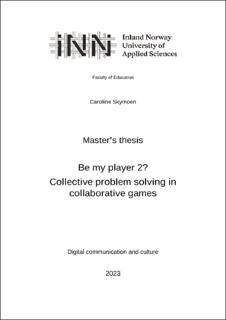| dc.contributor.advisor | | |
| dc.contributor.author | Skymoen, Caroline | |
| dc.date.accessioned | 2023-07-01T16:10:27Z | |
| dc.date.available | 2023-07-01T16:10:27Z | |
| dc.date.issued | 2023 | |
| dc.identifier | no.inn:inspera:136494868:29736657 | |
| dc.identifier.uri | https://hdl.handle.net/11250/3075111 | |
| dc.description.abstract | Denne masteroppgaven undersøker karakteristiske trekk ved kollaborative samarbeidsspill ved å analysere tre spill, og har som formål å forstå hvordan disse fremmer felles problemløsning gjennom gameplay og historiefortelling. Ved hjelp av tekstlig analyse undersøker denne studien spillenes egenskaper og deres potensielle innvirkning på samarbeid mellom spillerne.
Utgangspunktet for denne studien argumenterer for at det er en forskjell mellom kollaborative og kooperative samarbeidsspill, tatt fra et utgangspunkt i Zagal et al.s (2006, p. 25) definisjon av kollaborative samarbeidsspill. Denne oppgaven hevder at et tillegg til denne definisjonen er nødvendig for bedre å kunne skille mellom de to sjangrene, og legger til behovet for gjensidig engasjement og avhengighet for at et spill kan kalles kollaborativt. Denne påstanden tar utgangspunkt i læringsteori, og dette kravet viser seg å være oppfylt i samtlige av analysespillene.
Funnene viser at kollaborative samarbeidsspill gir spillerne kompletterende roller og ferdigheter som gjør at de er gjensidig avhengige av hverandre. Spillene hadde også en betydelig mangel på distraksjoner fra samarbeidsoppgaven ved å ha et lineært nivådesign og en lineær historie, ved å minimere rollene til ikke-spillbare karakterer og ved å ha et begrenset rom for utforskning på egenhånd og å ta egoistiske avgjørelser. De kollaborative samarbeidsspillene som viste ulik informasjon til hver spiller la vekt på kommunikasjon gjennom verbal interaksjon, mens det siste spillet hadde som mål å fremme lagbasert problemløsning ved å inkorporere en rik historie som illustrerte betydningen og virkningen av samarbeid. Disse funnene fremhever potensialet for kollaborative samarbeidsspill som et verktøy for å forbedre kollektiv problemløsning og lagarbeid. Funnene gir også innsikt i designprinsipper som kan fremheve effekten av slike spill for utdanningsmessige eller profesjonelle formål. | |
| dc.description.abstract | This thesis investigates the distinctive features of collaborative games by analysing three games in order to understand how they foster collective problem solving through gameplay and narrative. Using textual analysis, this study examines the games' characteristics and their potential impact on player collaboration.
The starting point of this study argues that there is a difference between collaborative and cooperative games, taking a basis in Zagal et al.’s (2006, p. 25) definition of collaborative games. This thesis claims that an addition to the definition is needed in order to better distinguish the terms and adds the requirement of mutual engagement and dependence for a game to be truly collaborative. This claim takes a basis in learning theory and the requirements are proved to be present in the games of analysis.
The findings were that collaborative games feature complementary roles and abilities that make the players interdependent on each other. The games also featured a noticeable lack of distraction from the task of collaboration, by featuring linear level design and narrative, minimising the roles of non-playable characters and having little room for exploration on their own and selfish decisions. The collaborative games that displayed various information on their screens emphasized communication through verbal interaction, whereas the final game aimed to promote team problem solving by incorporating a rich narrative to illustrate the significance and impact of collaboration. These findings highlight the potential of collaborative games as a tool for possibly enhancing collective problem solving and teamwork. They also provide insights into the design principles that could enhance the effectiveness of such games for educational or professional purposes. | |
| dc.language | eng | |
| dc.publisher | Inland Norway University | |
| dc.title | Be my player 2? Collective problem solving in collaborative games | |
| dc.type | Master thesis | |
